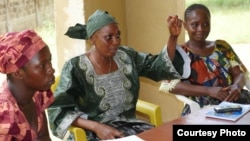As the Ebola epidemic fades in intensity, medical concerns are shifting to the ongoing treatment of survivors. Many report persistent problems, from impaired vision to depression and fatigue to chronic pain.
Psychological trauma, too, has "left people feeling low in energy, feeling some sadness, frustrated by some of the community response," said Dr. John Frankhauser, deputy medical director of a Liberian clinic specializing in free care for Ebola survivors.
The clinic is at ELWA Hospital in Paynesville, on the outskirts of Monrovia. Liberia discharged its last confirmed Ebola patient Thursday and must go a full 42 days without any new cases to be declared Ebola-free.
Even then, the challenges won’t be over, as Frankhauser can attest.
Patients from young children to older adults complain of similar symptoms, he said.
These include “a lot of musculo-skeletal problems.” People “come in with very severe aching in their joints, in their hips, in their knees. Some of them have been having a hard time walking, shuffling into clinic.
"And these are patients who have often suffered with this for months," Frankhauser added. "Some of them have sought care and been turned away because of people’s fear of Ebola."
Clinic offers aid
They find care and support at the clinic, funded by the U.S.-based Christian charity SIM (Serving in Mission).
Eye trouble tops the list of complaints. Frankhauser said one of the clinic’s "greatest needs is eye specialists and access to eye medication and eye specialty care."
William Peewu had come to the clinic for a checkup. He was released from an Ebola treatment unit October 14. After his three-week battle with Ebola, he said, things looked blurry, his high blood pressure was flaring up and he started getting headaches.
"I used to write without glasses," he said.
He's been in treatment for a month, and did not elaborate on it, but may still need to see a specialist. "I can write now sometimes without glasses," Peewu said, “though my vision is not still correct."
'Post-Ebola syndrome'
Physicians don’t know what causes this host of physical symptoms. Many are simply calling it "post-Ebola syndrome."
Experts say it could be the result of the body’s immune response to Ebola or else an inflammation or nerve damage. The symptoms could stem from the heavy disinfectants used during treatment.
The World Health Organization said research is needed.
Approximately 24,000 people in Guinea, Liberia and Sierra Leone have contracted Ebola since late December 2013, WHO records show. More than 14,000 have survived the disease. Never before has Ebola affected so many people or left so many survivors.




